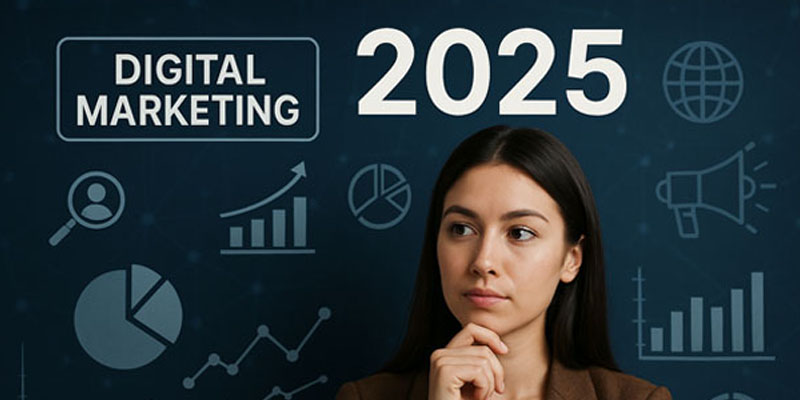The Future of Digital Marketing in 2025: Trends, Technologies, and Strategies
Introduction
Digital marketing is evolving at an unprecedented pace, driven by advancements in artificial intelligence (AI), automation, data analytics, and consumer behavior shifts. By 2025, the digital marketing landscape will be more personalized, immersive, and data-driven than ever before. Businesses that adapt to these changes will thrive, while those that resist may fall behind.
In this article, we’ll explore the key trends, technologies, and strategies that will shape the future of digital marketing in 2025.
1. Artificial Intelligence (AI) and Machine Learning (ML) Dominate Marketing Strategies
Tags: #AI #MachineLearning #Automation #Chatbots #PredictiveAnalytics
AI and ML are already transforming digital marketing, but by 2025, their influence will be even more profound:
-
Hyper-Personalization: AI will analyze consumer behavior in real-time to deliver highly personalized content, product recommendations, and ads.
-
AI-Powered Chatbots & Virtual Assistants: Advanced chatbots will handle complex customer queries, improving engagement and reducing response times.
-
Predictive Analytics: Marketers will use AI to forecast trends, optimize campaigns, and predict customer needs before they arise.
-
Automated Content Creation: AI tools like GPT-4 and beyond will generate blog posts, social media captions, and even video scripts.
2. Voice Search and Conversational Marketing Take Center Stage
Tags: #VoiceSearch #ConversationalMarketing #VoiceSEO #SmartSpeakers
With the rise of smart speakers (Amazon Alexa, Google Home) and voice assistants (Siri, Google Assistant), voice search optimization will be crucial:
-
Voice SEO: Brands will optimize content for natural language queries (e.g., “Where can I buy organic coffee near me?”).
-
Conversational AI: Businesses will leverage chatbots and voice assistants for seamless customer interactions.
-
Audio Ads & Podcast Marketing: Voice-based ads and branded podcasts will become key engagement tools.
3. The Rise of Augmented Reality (AR) and Virtual Reality (VR) in Marketing
Tags: #AugmentedReality #VirtualReality #ImmersiveMarketing #ARAds
AR and VR will revolutionize customer experiences:
-
Virtual Try-Ons & Showrooms: E-commerce brands will use AR to let customers “try before they buy” (e.g., makeup, furniture).
-
Immersive Brand Experiences: VR-powered virtual events, product launches, and store tours will enhance engagement.
-
Interactive Ads: AR ads will allow users to engage with products in 3D before purchasing.
4. Privacy-First Marketing and the End of Third-Party Cookies
Tags: #PrivacyMarketing #FirstPartyData #GDPR #CookielessFuture
With Google phasing out third-party cookies by 2024 and stricter data privacy laws (GDPR, CCPA), marketers must adapt:
-
First-Party Data Collection: Brands will rely on email lists, loyalty programs, and zero-party data (data willingly shared by users).
-
Contextual Advertising: Instead of tracking users, ads will be served based on webpage content.
-
Blockchain for Transparency: Some companies may use blockchain to ensure secure, transparent data transactions.
5. Video Marketing Continues to Dominate
Tags: #VideoMarketing #ShortFormVideo #LiveStreaming #TikTokMarketing
Video content will remain king in 2025, with new trends emerging:
-
Short-Form Videos: TikTok, Instagram Reels, and YouTube Shorts will dominate social media strategies.
-
Live Shopping & Interactive Videos: Brands will host live-streamed shopping events with real-time purchasing.
-
AI-Generated Video Content: Tools like Synthesia and D-ID will create realistic AI-powered video ads.
6. The Growth of Social Commerce and Shoppable Content
Tags: #SocialCommerce #ShoppablePosts #InstagramShopping #TikTokShop
Social media platforms are becoming full-fledged e-commerce hubs:
-
In-App Purchases: Instagram, TikTok, and Pinterest will expand shoppable features.
-
Influencer-Driven Sales: Micro-influencers will play a bigger role in driving conversions.
-
AI-Powered Product Recommendations: Social platforms will suggest products based on user behavior.
7. Sustainability and Ethical Marketing Gain Importance
Tags: #SustainableMarketing #GreenBusiness #CSR #EthicalBranding
Consumers increasingly prefer eco-friendly and socially responsible brands:
-
Green Marketing Campaigns: Brands will highlight sustainability efforts (e.g., carbon-neutral shipping).
-
Transparency in Sourcing: Companies will use blockchain to verify ethical supply chains.
-
Cause-Based Marketing: Aligning with social causes (e.g., climate change, diversity) will boost brand loyalty.
8. The Integration of Web3 and Metaverse Marketing
Tags: #Metaverse #Web3 #NFTMarketing #DecentralizedBrands
The metaverse and Web3 technologies will open new marketing avenues:
-
Virtual Brand Experiences: Companies will host events, concerts, and stores in the metaverse.
-
NFT-Based Loyalty Programs: Brands may reward customers with exclusive NFTs.
-
Decentralized Social Media: Platforms like Mastodon and Lens Protocol could challenge traditional social networks.
Conclusion: Adapt or Get Left Behind
The future of digital marketing in 2025 will be shaped by AI, privacy concerns, immersive technologies, and evolving consumer expectations. Businesses must stay agile, adopt new tools, and prioritize customer-centric strategies to remain competitive.
Key Takeaways:
✅ Leverage AI for personalization and automation.
✅ Optimize for voice search and conversational marketing.
✅ Embrace AR/VR and video content.
✅ Focus on first-party data and privacy compliance.
✅ Explore Web3 and metaverse opportunities.
By staying ahead of these trends, marketers can future-proof their strategies and drive success in the ever-evolving digital landscape.
Tags for SEO:
#DigitalMarketing2025 #FutureOfMarketing #MarketingTrends #AIMarketing #VoiceSearchOptimization #MetaverseMarketing #SocialCommerce #VideoMarketing #SustainableBrands #PrivacyFirstMarketing

